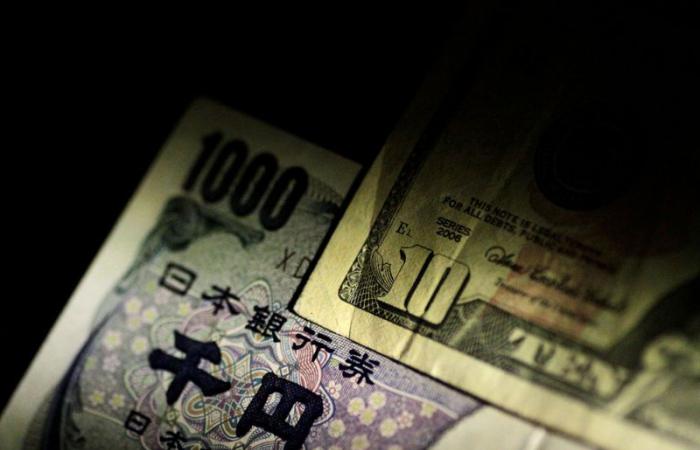The dollar remained stable on Monday as traders looked to new clues about the path of US inflation that is likely to influence interest rates, while speeches from Japanese officials did little to temper the yen’s decline towards the round number 160.
The yen weakened to 159.94 per dollar in early trade on Monday, the lowest since April 29, when the yen hit a 34-year low of 160.245, leading Japanese authorities to spend about 9.8 trillion yen to support the currency.
It was last seen at 159.70 per dollar, after Japan’s top currency diplomat, Masato Kanda, said on Monday that authorities will take appropriate action in case of excessive foreign currency movements and that Japan’s addition to the US Treasury forex monitoring list will not limit their action.
The yen came under renewed pressure following the Bank of Japan’s (BOJ) decision this month not to reduce its bond-buying stimulus until its July meeting.
A summary of views emerging at the BOJ’s June policy meeting on Monday showed that some policymakers called for raising interest rates in a timely manner as they saw a risk of inflation expectations being exceeded.
“It is quite remarkable that despite expectations of further BOJ policy tightening, dollar/yen continues to rise and is now back at 160,” said Carol Kong, currency strategist at Commonwealth Bank of Australia.
“I think that unless the BOJ makes very false suggestions on policy, which is unlikely, it is unlikely that the dollar/yen can turn around in a sustained way.”
The dollar index, which measures the U.S. unit against six peers, was last at 105.84, near a nearly eight-week high of 105.91 hit last week.
This week the spotlight will be on the US Personal Consumption Expenditures (PCE) price index – the Federal Reserve’s preferred inflation gauge – due on Friday.
Economists polled by Reuters expect the index’s annual growth to slow to 2.6% in May and a weak reading will likely strengthen bets on an interest rate cut as early as September, which futures currently price as a 65% prospect.
Evidence that the U.S. economy is slowing is accumulating, Citi strategists said in a client note, saying weaker demand makes a series of softer core inflation readings more likely.
“The combination of a slowdown in activity, a easing labor market and slower inflation readings make us increasingly confident that the Fed will begin cutting policy rates in September,” they said from Citi .
Over the course of the week, attention will also turn to geopolitics, with the first US presidential debate on Thursday and the first round of voting in the French election at the weekend.
The euro, under pressure since French President Emmanuel Macron called a snap election earlier this month, was little changed at $1.0693. The single currency is down 1.4% this month.
France’s far-right National Rally (RN) party and its allies were leading the first round of the country’s elections with 35.5% of the vote, according to a poll released on Sunday.
Christopher Wong, currency strategist at OCBC, said the impact on the euro may vary, but is likely to be skewed downwards unless the result surprises with a victory for President Macron’s coalition.
In other currencies, the pound was flat at $1.2643. The Australian dollar was last at $0.6640 and the New Zealand dollar was little changed at $0.6113.






